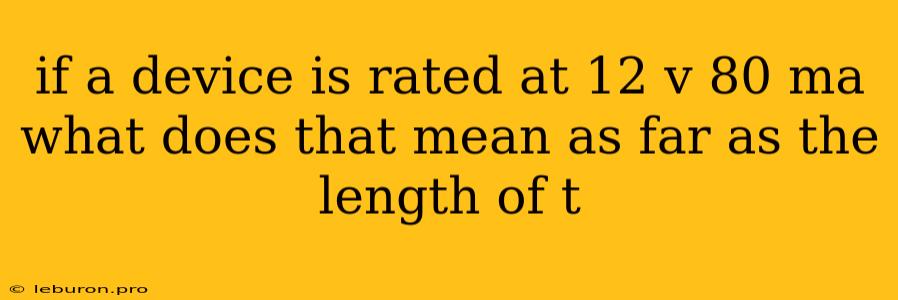Understanding the power requirements of a device is essential when it comes to choosing the right power source or battery. A common way to express these requirements is through voltage and current ratings, often seen as "12V 80mA". This article delves into the meaning of these ratings and how they relate to the length of time a device can operate.
Deciphering the Numbers: Voltage and Current
The two key figures, "12V" and "80mA," represent the device's voltage and current requirements, respectively.
- Voltage (V): Voltage is a measure of electrical potential difference. It essentially indicates the "push" or "pressure" that drives electrons through a circuit.
- Current (mA): Current measures the flow of electrical charge through a circuit. The unit "mA" stands for milliamperes, a thousandth of an ampere (A).
Power Consumption and Battery Life
While voltage and current are important, it's their combination that determines the power consumption of a device. Power is calculated using the following formula:
Power (P) = Voltage (V) x Current (I)
In our example:
- Power = 12V x 80mA = 960 milliwatts (mW)
This means the device consumes 960 mW of power when operating.
The Relationship with Battery Life
The length of time a device can run on a battery is directly related to the battery's capacity and the device's power consumption. Battery capacity is usually measured in milliampere-hours (mAh).
- Higher Battery Capacity: A battery with a higher mAh rating can provide power for a longer duration.
- Lower Power Consumption: A device with lower power consumption will drain the battery slower, extending the operating time.
To estimate the battery life, you can use this formula:
Battery Life (hours) = Battery Capacity (mAh) / Power Consumption (mA)
Example:
If you have a battery with a capacity of 1000mAh, the device with a 12V 80mA rating would theoretically last for:
- Battery Life = 1000mAh / 80mA = 12.5 hours
Important Considerations:
- Real-world Battery Life: This calculation is a theoretical estimate. Actual battery life can vary depending on factors like temperature, load, and the specific battery chemistry.
- Power Efficiency: The efficiency of the device's circuitry also plays a role. If the device is less efficient, it will consume more power and reduce battery life.
- Battery Discharge Rate: Batteries have a rated discharge rate. Using a battery above its rated discharge rate can lead to reduced capacity and lifespan.
Choosing the Right Battery
When selecting a battery for a device, ensure the battery's voltage matches the device's requirements. The capacity should be sufficient to provide the desired operating time. It's also wise to consider the battery's discharge rate to avoid exceeding its limits.
Conclusion
Understanding the meaning of voltage and current ratings, as well as the relationship between power consumption and battery life, is crucial for making informed decisions about your device's power source. The "12V 80mA" rating indicates the device's power requirements, which can be used to determine how long the device will operate on a given battery capacity. When choosing a battery, pay attention to the voltage, capacity, and discharge rate to ensure a reliable and long-lasting power source for your device.
